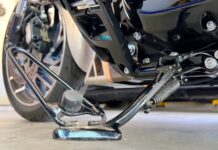You used to be a “manic depressive,” now you are labeled with “bipolar disorder.”
Personally I prefer the term manic-depressive; it seems to describe the extremes better. Bipolar disorder somehow implies that it is illegal to live in the freezing polar extremes of either the Arctic or Antarctic, but it is just fine to be bored in the steamy doldrums of the Equator.
So, what is a manic-depressive? Simple; when you are up you are really up… really up there 20 stories at 100 miles an hour. It’s like taking a handful of whites, grabbing hold of the tail of a dragon and holding on for the ride. When you are down you are a POW in the Hanoi Hilton and you have just been given a bucketload of reds by a Viet Cong prison guard.
Everyone gets up for the big game and everyone gets moody, but when does a person traverse these emotions and go from regular to crazy? One self-diagnostic tool says you’ve crossed over when your highs are so extreme that your friends start asking, “Are you nuts? What the hell are you doing? Do you really think you can pull that off?” And that is coupled with the despondency of the next day, when you hear, “Get out of bed. Do something. Snap out of it.”
It’s time to self-evaluate when your girlfriend says, “You know… when you are up you are the most fun person I have ever been with. Damn, you can think of the craziest things to do. And in bed… well… But you can get so moody. What’s wrong with you? I don’t know what to do with you. Are there medications you can take?”
If she catches you with that speech when you are up, hostile or unstable, tearing the poor girl’s head off with sarcasm, suggesting that she exemplifies the exact same psychosis every 28 days and that she should take a Valium and buy shares in Midol is a waste of time. Informing her that you will keep the “Wolf Man” in check if she controls her monthly PMS hormones might win a debate, but it won’t win a girlfriend and is just plain cruel.
If she wants to talk it out when you are down, it won’t make any difference what you say. She won’t be able to understand your mumbling.
I liked it better when no one worried about the mood swings. The highs translated into feeling good and the lows were just depression. Of course saying just depression is like saying just cancer. When the medical profession defined us as manic-depressives we had an excuse to be both outrageous and despondent. Up until then I just thought it was too much caffeinated coffee without sleep mixed with midterms and final exams.
In college the manic sits in front of the class and answers every question and argues with the professors. Two days later the depressive skips class altogether, stays in his dorm room and sleeps for a week.
If by a quirk of fate the manic-depressive finds a way to graduate, he had better get a job placement where it is not important that he be consistent and punch a time clock. Employment where he can get all his work done by coming in early on Mondays and working straight through until Tuesday night and then miss Wednesdays, Thursdays and Fridays is a much better fit. Better yet he should find a way of working for himself.
Prozac can be prescribed to take off the edges, cutting the highs down to size and making the lows a bit less miserable. But pills make everything average and medium. For the manic-depressive who has scaled mountain tops, a medicated flat plateau is not a substitute. Having felt bliss, average is not a replacement for wonderful!
Some of us self-diagnosed manic-depressives self-medicated ourselves with cigarettes and booze. Scotch whisky and Camel cigarettes were less expensive than doctors. However, there is a secondary problem with Scotch. The really good stuff is expensive and most cheap bars don’t carry single malt. So you drink Cuddy and wish it was Glenlivet. That usually ends up in an argument and a bar fight, which means you have to be either very good with your fists or a fast runner.
Winston Churchill used to call his depressions “the black dog,” but somehow in spite of his mood swings he found a way to self-medicate and lead England through World War II and write countless articles and 43 book-length works in 72 volumes.
Van Gogh cut off his ear but self-medicated himself by producing 2,100 works of art.
Some of us who realize that the extreme highs must be balanced with the corresponding lows have discovered how to self-medicate ourselves on a daily basis. We do it with motorcycles. A maintenance prescription of motorcycles helps even out our moods. It is a way to adjust life with engine RPM.
Working the carburetor on the internal combustion engine of a motorcycle to find the proper dosage is not for the squeamish or the ill advised. It requires great caution, practice and years of experimentation. It is possible to modify the manic highs or the depressive lows with the throttle but starting off with small daily doses is mandatory. Up a little faster, down a little slower and yes, you can twist too much throttle. Jumping on a bike at the height of an attack of euphoria will send you over the same cliff as riding during a fit of despondency. You can start with a different frame of mind, but it is the same cliff. Like I said, small daily maintenance doses are required, taken in baby steps and with a mandatory modifier of logic or you will never live to ride a second bike.
Let’s be clear: Motorcycles are not for everyone, and adjusting emotions with motorcycles can be foolhardy. Trying to balance and create stability for mental equilibrium with a machine is nearly unattainable, but some of us have figured out what the proper dosage is and have established a daily regimen that works for us.
I’ll say it again. This is not for everyone. I suggest that no one try it. It just works for some of us.



















